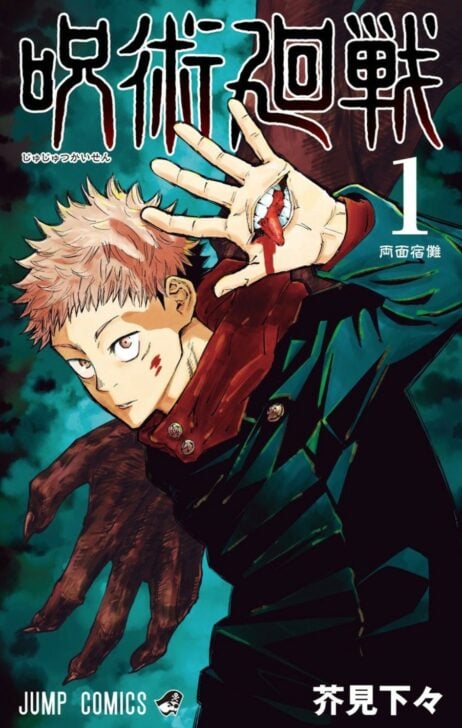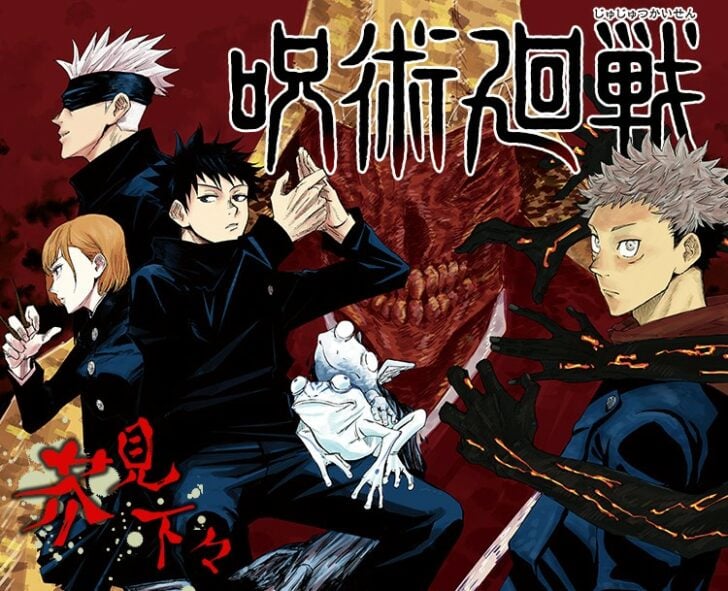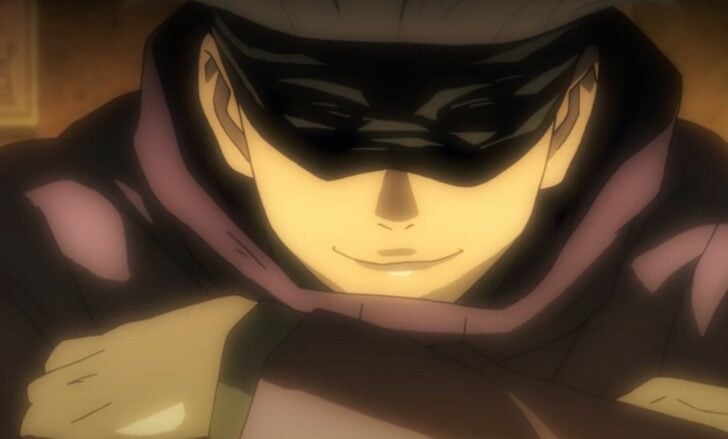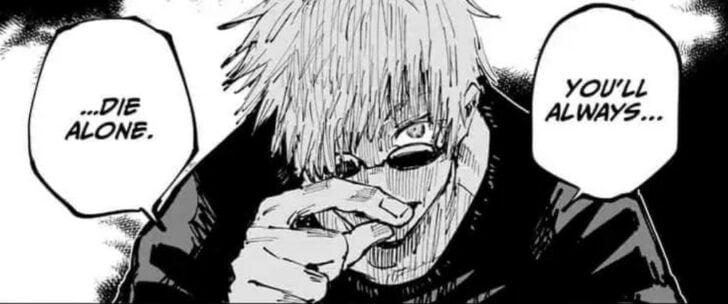Share on your favorite
Or copy the link
Below are navigation links that will take you to the main text and navigation menus.
26,551 first names, 70,620 last names, 333,585 kanji variations.
one of the best Japanese name search tools for your baby!

Image by: Jujutsukaisen Sorcery fight comic 1 © Gege Akutami, Shueisha Inc
Contents
Jujutsu Kaisen: Sorcery Fight, a story written and illustrated by Gege Akutami. In a world where cursed spirits dwell amongst unwary humans, fragments of the most powerful and feared demon Ryoumen Sukuna have been scattered all around the world. Should any living being consume any of Sukuna’s body parts, the power they obtain could destroy the whole world. However, there is more power in a single finger than most sorcerers can contain, making it extremely hard for humans to gain superpowers. Fortunately, there are one in a million people who can serve as a vessel for Sukuna’s power, one of them being Yuji who is not your average teenager.

Jujutsukaisen Sorcery fight comic 1 © Gege Akutami, Shueisha Inc
The Japanese title of Sorcery Fight is ‘Jujutsu Kaisen'(呪術廻戦). ‘Jujutsu'(呪術) is sorcery or to curse someone, ‘Kai'(廻) means a cycle, and ‘Sen'(戦) is to fight. In the story, very few people can use powers called ‘Jujutsu’, and those who can use it are called Jujutsu Sorcerers.

Image by: Jujutsukaisen Sorcery fight comic 1 © Gege Akutami, Shueisha Inc
In Japanese culture, names have significant meanings that are supposed to represent you as a person. Names can be expressed in hiragana, katakana, and kanji. Let’s find out the meanings of some names of characters in Jujutsu Kaisen : Sorcery Fight.

Image by: Jujutsukaisen Sorcery fight PV © Gege Akutami, Shueisha Inc, Jujutsukaisen production committee
First, let’s start with the hero of this story, Yuji! Yuji is the one in a million that can contain Sukuna’s power as his vessel and is born with immense physical strength. ‘Itadori’(虎杖) is the name of a plant, however, both kanji have different meanings. ‘Ita’(虎) can also read as ‘Tora’ which is a tiger, and ‘Dori’(杖) which is a cane can be read as ‘Tsue’. ‘Yu’(悠) means calm, and ‘Ji’(仁) is benevolent.

Image by: Jujutsukaisen Sorcery fight PV ©Gege Akutami, Shueisha Inc, Jujutsukaisen production committee
Next is Megumi, the comrade, and friend of Yuji. He is quiet and doesn’t prefer to show emotion yet inside he cares about his friends and family and wishes to protect the kind people on earth. The name ‘Megumi’ is a girl’s name, however, it was given to him by his heartless dad who couldn’t have cared less about his existence let alone his gender. ‘Fushi’(伏) is to bend down, ‘Guro’(黒) is black, and ‘Megumi’(恵) is a blessing.

Image by: Jujutsukaisen Sorcery fight PV ©Gege Akutami, Shueisha Inc, Jujutsukaisen production committee
Now let’s look into another one of Yuji’s friends, Nobara. She has great confidence in herself and will not forgive anyone who annoys, insults, or looks down on her. Her personality is just as strong as her fighting skills and can defeat any curse with her nails and hammer. ‘Kugi’(釘) is a nail, and ‘Saki’(崎) is a cape. ‘No’(野) is a field, ‘Bara’(薔薇) is a rose and together it becomes ‘Nobara’(野薔薇), a wild rose.

Image by: Jujutsukaisen Sorcery fight PV ©Gege Akutami, Shueisha Inc, Jujutsukaisen production committee
Satoru is the mentor of Yuji and the one who taught him about the world of Jujutsu. He is one of the most powerful sorcerers and the first in a hundred years to possess the ‘Six Eyes’ as well as the ‘Limitless Curse Technique’. ‘Go’(五) is five, ‘Jo’(条) means category, and ‘Satoru’(悟) is to understand.

Image by: Jujutsukaisen Sorcery fight PV © Gege Akutami, Shueisha Inc, Jujutsukaisen production committee
Last but not least, the King of Demons Sukuna. Thousands of years ago, Sukuna was defeated by Jujutsu Sorcerers. They didn’t manage to completely kill him so they scattered his body parts around the globe and they became cursed objects. Sukuna is the name of the fierce god with two faces, four arms, and four legs that appeared in ancient Japan. ‘Ryomen’(両面) is double-sided, ‘Suku’(宿) means lodging, and ‘Na’(儺) is a ceremony of dispossession
Here are some useful phrases from Jujutsu Kaisen : Sorcery Fight that will help you along with your Japanese studies!

Image by: Jujutsukaisen Sorcery fight comic 7 Ep 58 ©Gege Akutami, Shueisha Inc,
‘Shinu’(死ぬ) is to die, ‘Toki’(とき in kanji, 時) is time. There are two ways to write ‘Hitori’ which are 一人 and 独り. While ‘Hitori’(一人) means one person, the other ‘Hitori’(独り) means alone.
Sort by: Most Kanji Variations
Sorts names by how many different kanji spellings they have. In general, names with more variants tend to be more familiar and widespread in Japan (with some exceptions).
Sort by: Most Viewed
Sorts names by page views on this site. Views reflect global traffic (including Japan), so this does not represent popularity among Japanese people only. A high view count does not necessarily mean the name is famous in Japan.
What is Hiragana?
Hiragana is one of the two Japanese syllabaries. Each character represents a sound (mora), not a meaning. It is used for native words, grammatical particles, verb/adjective endings (okurigana), and to show pronunciation above kanji (furigana). It developed from cursive forms of kanji.
What is Katakana?
Katakana is one of the two Japanese syllabaries. Each character represents a sound (mora), not a meaning. It is mainly used to write foreign words and names, loanwords, onomatopoeia, and for emphasis.
What are English Syllables?
A syllable is a unit of pronunciation in English — it’s the beat you hear when you say a word.
Here are a few quick examples:
cat = 1 syllable
ba-by = 2 syllables
beau-ti-ful = 3 syllables
On this site, English Syllables show how a name naturally breaks into sounds when spoken in English. This helps you understand how English speakers naturally say the name and where they pause between sounds.
What are Japanese Morae?
A mora (plural: morae, Japanese: 拍 Haku) is the basic unit of sound in Japanese — think of it as one rhythmic “beat” when speaking.
Here are a few quick examples:
あ (a) = 1 mora
あい (a-i) = 2 morae
きょう (kyo-u) = 2 morae
On this site, Japanese Morae show how many “beats” a name has in Japanese. Most Japanese names have about 2–4 morae, which affects how natural and rhythmic the name sounds to native speakers.
This helps you see how the name fits into the natural rhythm of Japanese speech.
What is English Transcription?
“English transcription” (romanization) is the romanized form of a Japanese name, intended to reproduce its pronunciation as closely as possible. It is also useful for searching names on this site.
Japanese-Style Nicknames
In Japan, nicknames are used to express familiarity and affection. Typical features include:
Shortened forms: Names are often shortened for closeness, e.g., “Yuki” from “Yukiko” or “Taka” from “Takashi”.
Suffixes: Terms like “-chan” (often for girls, also for young children) and “-kun” (often for boys) are used among family and close friends. Among very close adults, “-chan” may still be used. More details
Use & context: Nicknames are informal—common among friends, family, or close colleagues—and are not suitable for formal or professional settings. Their use implies a certain degree of intimacy.
Long vowels: The long vowel mark “chōonpu” (ー) extends the preceding vowel. For example, “あーちゃん” (A-chan) lengthens the “あ” sound.
Households
Sorts surnames by the estimated number of Japanese households that use them. More households generally indicates a more common or well-known surname.
About our last-name data
